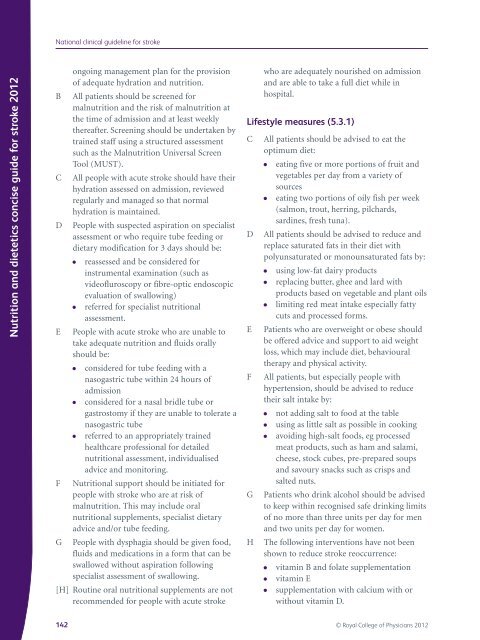national-clinical-guidelines-for-stroke-fourth-edition
national-clinical-guidelines-for-stroke-fourth-edition
national-clinical-guidelines-for-stroke-fourth-edition
Create successful ePaper yourself
Turn your PDF publications into a flip-book with our unique Google optimized e-Paper software.
Nutrition and dietetics concise guide <strong>for</strong> <strong>stroke</strong> 2012<br />
National <strong>clinical</strong> guideline <strong>for</strong> <strong>stroke</strong><br />
ongoing management plan <strong>for</strong> the provision<br />
of adequate hydration and nutrition.<br />
B All patients should be screened <strong>for</strong><br />
malnutrition and the risk of malnutrition at<br />
the time of admission and at least weekly<br />
thereafter. Screening should be undertaken by<br />
trained staff using a structured assessment<br />
such as the Malnutrition Universal Screen<br />
Tool (MUST).<br />
C All people with acute <strong>stroke</strong> should have their<br />
hydration assessed on admission, reviewed<br />
regularly and managed so that normal<br />
hydration is maintained.<br />
D People with suspected aspiration on specialist<br />
assessment or who require tube feeding or<br />
dietary modification <strong>for</strong> 3 days should be:<br />
● reassessed and be considered <strong>for</strong><br />
instrumental examination (such as<br />
videofluroscopy or fibre-optic endoscopic<br />
evaluation of swallowing)<br />
● referred <strong>for</strong> specialist nutritional<br />
assessment.<br />
E People with acute <strong>stroke</strong> who are unable to<br />
take adequate nutrition and fluids orally<br />
should be:<br />
● considered <strong>for</strong> tube feeding with a<br />
nasogastric tube within 24 hours of<br />
admission<br />
● considered <strong>for</strong> a nasal bridle tube or<br />
gastrostomy if they are unable to tolerate a<br />
nasogastric tube<br />
● referred to an appropriately trained<br />
healthcare professional <strong>for</strong> detailed<br />
nutritional assessment, individualised<br />
advice and monitoring.<br />
F Nutritional support should be initiated <strong>for</strong><br />
people with <strong>stroke</strong> who are at risk of<br />
malnutrition. This may include oral<br />
nutritional supplements, specialist dietary<br />
advice and/or tube feeding.<br />
G People with dysphagia should be given food,<br />
fluids and medications in a <strong>for</strong>m that can be<br />
swallowed without aspiration following<br />
specialist assessment of swallowing.<br />
[H] Routine oral nutritional supplements are not<br />
recommended <strong>for</strong> people with acute <strong>stroke</strong><br />
who are adequately nourished on admission<br />
and are able to take a full diet while in<br />
hospital.<br />
Lifestyle measures (5.3.1)<br />
C All patients should be advised to eat the<br />
optimum diet:<br />
● eating five or more portions of fruit and<br />
vegetables per day from a variety of<br />
sources<br />
● eating two portions of oily fish per week<br />
(salmon, trout, herring, pilchards,<br />
sardines, fresh tuna).<br />
D All patients should be advised to reduce and<br />
replace saturated fats in their diet with<br />
polyunsaturated or monounsaturated fats by:<br />
● using low-fat dairy products<br />
● replacing butter, ghee and lard with<br />
products based on vegetable and plant oils<br />
● limiting red meat intake especially fatty<br />
cuts and processed <strong>for</strong>ms.<br />
E Patients who are overweight or obese should<br />
be offered advice and support to aid weight<br />
loss, which may include diet, behavioural<br />
therapy and physical activity.<br />
F All patients, but especially people with<br />
hypertension, should be advised to reduce<br />
their salt intake by:<br />
● not adding salt to food at the table<br />
● using as little salt as possible in cooking<br />
● avoiding high-salt foods, eg processed<br />
meat products, such as ham and salami,<br />
cheese, stock cubes, pre-prepared soups<br />
and savoury snacks such as crisps and<br />
salted nuts.<br />
G Patients who drink alcohol should be advised<br />
to keep within recognised safe drinking limits<br />
of no more than three units per day <strong>for</strong> men<br />
and two units per day <strong>for</strong> women.<br />
H The following interventions have not been<br />
shown to reduce <strong>stroke</strong> reoccurrence:<br />
● vitamin B and folate supplementation<br />
● vitamin E<br />
● supplementation with calcium with or<br />
without vitamin D.<br />
142 © Royal College of Physicians 2012


